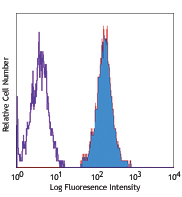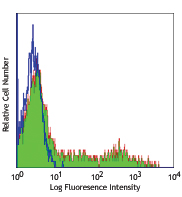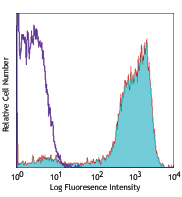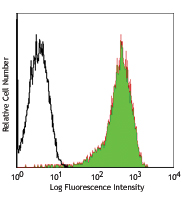- Clone
- BU63 (See other available formats)
- Regulatory Status
- RUO
- Workshop
- HCDM listed
- Other Names
- B7-2, B70, Ly-58
- Isotype
- Mouse IgG1, κ
- Ave. Rating
- Submit a Review
- Product Citations
- publications

-

Human peripheral blood monocytes stained with CD14 APC/Cyanine7 and human CD86 (clone BU63, top) PE or Mouse IgG1, κ PE isotype control (bottom).
| Cat # | Size | Price | Quantity Check Availability | Save | ||
|---|---|---|---|---|---|---|
| 374205 | 25 tests | $122 | ||||
| 374206 | 100 tests | $287 | ||||
CD86 is an 80 kD immunoglobulin superfamily member also known as B7-2, B70, and Ly-58. CD86 is expressed on activated B and T cells, monocytes/macrophages, dendritic cells, and astrocytes. CD86, along with CD80, is the ligand of CD28 and CD152 (CTLA-4). CD86 is expressed earlier in the immune response than CD80. CD86 has also been shown to be involved in immunoglobulin class-switching and triggering of NK cell-mediated cytotoxicity. CD86 binds to CD28 to transduce costimulatory signals for T cell activation, proliferation, and cytokine production. CD86 can bind to CD152 as well, also known as CTLA-4, to deliver an inhibitory signal to T cells.
Product DetailsProduct Details
- Verified Reactivity
- Human
- Antibody Type
- Monoclonal
- Host Species
- Mouse
- Immunogen
- ARH 77 (B lymphoblastoid cell line).
- Formulation
- Phosphate-buffered solution, pH 7.2, containing 0.09% sodium azide and BSA (origin USA)
- Preparation
- The antibody was purified by affinity chromatography and conjugated with PE under optimal conditions.
- Concentration
- Lot-specific (to obtain lot-specific concentration and expiration, please enter the lot number in our Certificate of Analysis online tool.)
- Storage & Handling
- The antibody solution should be stored undiluted between 2°C and 8°C, and protected from prolonged exposure to light. Do not freeze.
- Application
-
FC - Quality tested
- Recommended Usage
-
Each lot of this antibody is quality control tested by immunofluorescent staining with flow cytometric analysis. For flow cytometric staining, the suggested use of this reagent is 5 µl per million cells in 100 µl staining volume or 5 µl per 100 µl of whole blood.
- Excitation Laser
-
Blue Laser (488 nm)
Green Laser (532 nm)/Yellow-Green Laser (561 nm)
- Product Citations
-
- RRID
-
AB_2721632 (BioLegend Cat. No. 374205)
AB_2721633 (BioLegend Cat. No. 374206)
Antigen Details
- Structure
- Ig superfamily, single-chain transmembrane glycoprotein, 80 kD
- Distribution
-
Monocytes/macrophages, activated B cells and T cells, dendritic cells
- Function
- T Cell activation
- Interaction
- C-Jun, NFκB
- Ligand/Receptor
- CD28, CD152
- Cell Type
- B cells, Dendritic cells, Macrophages, Monocytes, T cells
- Biology Area
- Cell Biology, Costimulatory Molecules, Immunology, Neuroscience, Neuroscience Cell Markers
- Molecular Family
- CD Molecules, Immune Checkpoint Receptors
- Antigen References
-
1. Hathcock K, et al. 1996. Adv. Immunol. 62:131.
2. June C, et al. 1994. Immunol. Today 15:321. - Gene ID
- 942 View all products for this Gene ID
- UniProt
- View information about CD86 on UniProt.org
Related FAQs
- What type of PE do you use in your conjugates?
- We use R-PE in our conjugates.
Other Formats
View All CD86 Reagents Request Custom Conjugation| Description | Clone | Applications |
|---|---|---|
| Purified anti-human CD86 | BU63 | FC,Block,IP,WB |
| FITC anti-human CD86 | BU63 | FC |
| PE anti-human CD86 | BU63 | FC |
| APC anti-human CD86 | BU63 | FC |
| PE/Cyanine7 anti-human CD86 | BU63 | FC |
| Brilliant Violet 421™ anti-human CD86 | BU63 | FC |
| Brilliant Violet 605™ anti-human CD86 | BU63 | FC |
| PerCP/Cyanine5.5 anti-human CD86 | BU63 | FC |
| PE/Dazzle™ 594 anti-human CD86 | BU63 | FC |
Customers Also Purchased




Compare Data Across All Formats
This data display is provided for general comparisons between formats.
Your actual data may vary due to variations in samples, target cells, instruments and their settings, staining conditions, and other factors.
If you need assistance with selecting the best format contact our expert technical support team.
-
Purified anti-human CD86

Human peripheral blood monocytes stained with CD14 APC/Cyani... -
FITC anti-human CD86

Human peripheral blood monocytes stained with CD14 APC/Cyani... -
PE anti-human CD86

Human peripheral blood monocytes stained with CD14 APC/Cyani... -
APC anti-human CD86

Human peripheral blood monocytes stained with CD14 PerCP/Cya... -
PE/Cyanine7 anti-human CD86

Human peripheral blood monocytes stained with CD14 FITC and ... -
Brilliant Violet 421™ anti-human CD86

Human peripheral blood monocytes stained with CD14 APC and C... -
Brilliant Violet 605™ anti-human CD86

Human peripheral blood monocytes stained with CD14 FITC and ... -
PerCP/Cyanine5.5 anti-human CD86

Human peripheral blood monocytes stained with CD14 FITC and ... -
PE/Dazzle™ 594 anti-human CD86

Human peripheral blood monocytes stained with CD14 FITC and ...
 Login/Register
Login/Register 













Follow Us